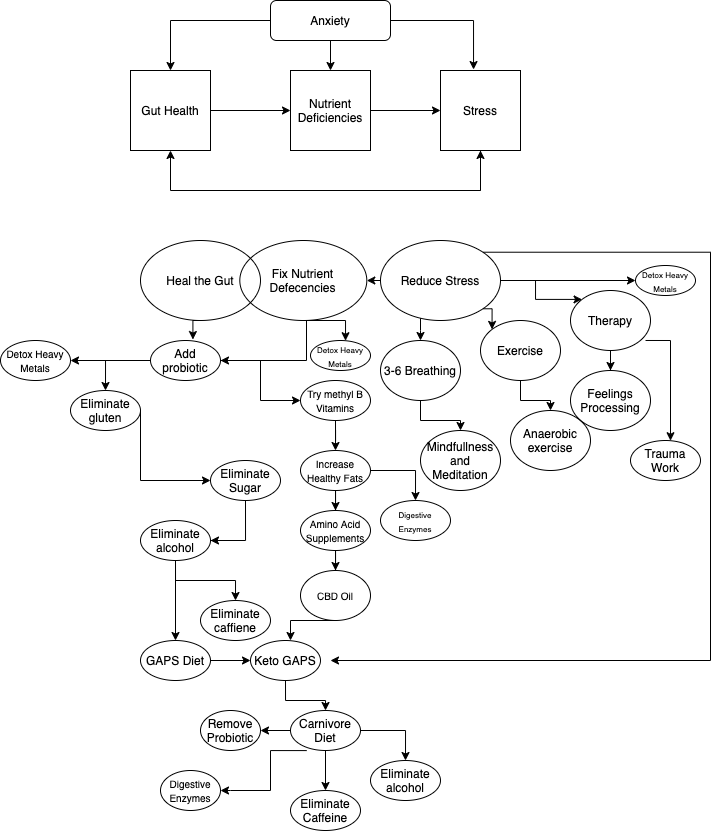
“Oh, yeah, and when I start pacing the house over and over, checking on all the kids every 20 minutes at night after they go to bed, and I think about natural disasters happening and what I’d do daily, I know it’s time to clean up my diet.” I’m explaining what I affectionately call my crazy to a friend, and how I’ve learned to manage it.
I didn’t realize it until I started doing dietary intervention for my daughter when I was 25, but I had suffered from anxiety my whole life. I had lived in slight terror, afraid that loved ones would die in car crashes daily, making obsessive habits that revolved around safety, being hyper vigilant about all manners of security – religion, finances, relationships, and more.
It was exhausting, but I never knew any different so I thought it was normal. Or just how I was made.
Once the life-changing anxiety was lifted and I saw what ‘normal’ was, I’ve carefully taken steps to make sure I don’t go back there.
Thankfully, even as a busy mom of three, I’ve easily been able to control my anxiety easily once I saw the results that simple lifestyle changes can make.
I’m not talking about exercise for 10 minutes a day, and ‘trying to watch what I ate’
I’m talking about completely cutting out the foods that feed the anxiety bugs so that they starve out, and my entire body composition changes. It was a radical change at first, but the results are undeniably effective, and the protocol is easy to stick with once you get past the initial stage. I’ll share more of how and why below.
We don’t need to be nervous at all times. You may have lived with anxiety for so long that you’re convinced that it’s just your personality, or you’re convinced that you wouldn’t be able to complete needed daily activities without mild-to-moderate underlying fear propelling you. But that’s a lie.
Healing your gut will help.
Anxiety
Anxiety is when a person is unnecessarily in the fight-or-flight mode in a consistent basis. Our body’s fear response is useful at preserving our lives, and that of our children. When we’re in fight or flight mode in a true emergency, we’re able to run further, lift heavier, and think faster than we normally ever could. This saves lives daily, and is a beautiful little trick that our body can do.
But when we’re in fight of flight mode constantly we:
- Have an upset stomach
- Have headaches
- Get panic attacks
- Are unable to concentrate
- Have trouble sleeping
- Are unable to enjoy life
No, it’s not all in your head.
It’s in your gut.
Intuitively, we know that anxiety is rooted in the gut. “butterflies in my tummy” “I have a nervous stomach” or “a gut feeling” are all phrases that you’ve heard before. In addition, most who suffer from anxiety also suffer from diarrhea.
There are a few ways that the gut is involved in anxiety.
- First, the gut (and really our whole body) is lined with a colony of bacteria. When the body is healthy and working well, we have beneficial bacteria that keep the opportunistic pathogenic bacteria held back. The beneficial bacteria also work with the wall of the gut to make enzymes for food digestion, stimulate cell regeneration, and help with immune function.
- Our good bacteria are able to crowd out the bad bacteria before they take root, much like a ground cover in your yard crowds out the weeds and prevents them from taking hold. When this balance of good-to-bad bacteria is off, the bad bacteria take over our guts.
- With this, the bad bacteria actually secrete chemicals as part of their metabolic process. These chemicals go through the gut wall and into the bloodstream, and can act like drugs in our brain. This can manifest as intense sugar cravings, brain fog, depression, or, as we’re talking about today, anxiety. Have you ever seen someone on a ‘bad trip’? I’ve lived in some questionable places in my life, and I’ve seen my fair share of bad trips – people on a bad drug trip really don’t look all that different from people having panic attacks. That’s how powerful these signals from the gut flora are.
- Second, there is brain tissue in your gut. There are about 500 million neurons (source) in your gut. These neurons help control your digestion, and they also work with your brain for your physical and mental well being. Your stress level directly impacts your gut, and can even cause your gut to be leaky (read more here).
- Third, lack of nutrients being absorbed by your gut create nutrient deficiencies in your body. When the body does not have the nutrients it needs to run the all-powerful brain, some systems get out of whack.
- Fourth, because so much of the detoxification system of our body is housed in our gut, when our gut health is not in good shape, we get a backup of toxins. Like the pathogenic bacteria, these toxins can once again re-enter the bloodstream, and affect our brain. In a healthy gut mild toxin exposure is easily accommodated for by the body, but in a damaged gut, we are unable to detoxify as well.
What are the conventional methods for managing anxiety?
-
- Learn to manage stress
- Talk therapy – acknowledge what is a real threat and what is not, replace negative self talk with positive self talk
- Breathing exercises
- Regular exercise
- Eating ‘balanced’ meals
- Valium
- Xanax
- Ativan
- Klonopin
- Other medications
Is this working for us?
While learning to manage stress, replace harmful thinking patterns with productive ones, exercise, and a ‘healthy diet’ (in quotes because conventionally, a healthy diet is different than what I would consider a health-promoting diet) are all helpful in managing short amounts of stress, they really don’t get to the root of the problem and keep it from coming back. They just manage it, and try to re-train the brain. This is a coping technique, not a cure.
With the medications, while they also can be useful in certain situations, they come with side effects that are undesirable to say the least:
- Dry mouth.
- Slurred speech.
- Drowsiness.
- Skin rash.
- Constipation.
- drowsiness, dizziness, problems with thinking or memory;
- tired feeling, muscle weakness, loss of balance or coordination;
- drooling or dry mouth, sore gums
- runny or stuffy nose;
- loss of appetite, nausea, diarrhea, constipation;
- blurred vision;
- headache
- Confusion
- Shallow breathing
- Unusual risk-taking behavior
- Painful urination
- Easy Bruising
- Seizures
- Dependence on medication
- And more…
I don’t list the side effects of the medication to shame you – I’m never about shaming. Rather, I want people to be aware that it isn’t meant to be a ‘fix’ but rather something temporary to help you get anxiety under control until something changes – whether you’re able to reduce your life stress, or find another method to treat your anxiety.
Being on a medication with side effects like these should never be a long-term solution unless all other options have been exhausted.
The ‘side effects’ of a gut healing diet?
This is what I’ve seen – these ‘good side effects’ show me that rather than further harming my body in attempt to solve one problem, I’m actually bringing everything into a balance, and my body is functioning like it should.
- Clear skin
- Craving healthy food
- Food allergies eliminated
- Seasonal allergies lessened
- Better sleep
- Higher energy
“All disease begins in the gut.” – Hippocrates
How to start balancing the gut to eliminate anxiety
- First we may need to start with supplements to correct nutrient deficiencies and try to temper the stress-causing leaky gut and leaky-gut-causing-anxiety cycle. I had good success with True Calm, an amino acid and herb blend (you can find this here).
- Advanced TRS binds to heavy metals and *doesn’t let them go* so they no longer can cause havok in the body and brain. Using TRS decreases your overall toxic load so your body is better able to heal itself. Learn more about heavy metal detoxification here.
- Cod liver oil gives the body easily absorbed fatty acids that the brain thrives on (more about cod liver oil here).
- My daughter saw calming benefits from L-Carnosine, which is also an amino acid. Many people who do not find success with Gaba (in True Calm) find that L-Carnosine is helpful. You can find L-Carnosine here.
- We also need to make healthy changes to our homes and reduce our toxic load – these are pretty basic steps but can make a big difference. Click here to get a free printable checklist for a 30-day plan to get this started in simple steps
- Next, we try an elimination diet. It’s so common that removing foods that often are allergy-causing, inflammation-causing, and cause a leaky gut. Removing dairy and/or gluten will most often relieve symptoms drastically.
- And then we can work our way back to really healing our gut with the GAPS diet, Keto GAPS, and Carnivore (in that order).
The GAPS Diet: Everything You Need to Know
The Ketogenic Version of the GAPS Diet
Why does the Carnivore Diet Work? - Then once we are stabilized and eliminating common allergens from our diet, we can work on restoring gut flora balance and healing the gut. Most importantly, we clean up the gut.
- Probiotics help, be sure to go slow – we’ll be introducing these beneficial bacteria, which will in turn kill off the bad ones – when this happens we can experience a rush of symptoms, so it’s important to go slowly.
- Things You Need to Know About High Quality Probiotics (read this before taking Biokult)
- When the gut flora is balanced and body is detoxified, we should crave healthy food, have a fairly stable mood, and feel nourished.
- Depending on your symptoms, you may be able to modify this protocol and still see great results; possibly just removing gluten, any known allergens (often eggs, wheat, or dairy), and increasing probiotics for a time.
How did this work for us?
As I talked about above, I tried the GAPS diet when I put my daughter on it when she was 3 (she had autism at the time and I was desperate for solutions). I was amazed that within 3 days I was so much more calm, and was so much more realistic about my worries and fears. It felt like a vacation from constant worry – it was wonderful.
The GAPS diet isn’t like a tranquilizer or a pill that numbs your feelings, but rather it gives you back normal feelings. So I wasn’t fearless, I just went to what normal should be for me.
I notice that every time junk food, starch, bread, or stress creeps into our diets, I get some anxiety symptoms back. We’ve been doing this for 5 years now (ever since I discovered the connection) and it’s so much simpler for me to just eat well (I eat full GAPS plus some rice and potatoes to maintain good mood) than to try to manage anxiety.
I also use diet as a preventative tool – If I know that something stressful is going to be coming up, like moving, I’ll clean up my diet even more- going on strict GAPS rather than the more paleoish eating plan that I’m normally on. When I’m sure to not feed the bad bugs, and I’m eating a clean diet of food that is not inflammatory, I am able to power through a stressful situation easily.
It’s really amazing to me to see the difference that a dietary change can make – it’s hands-down easier for me to monitor what I’m eating carefully and choose to say ‘no’ to food that will be bad for my mood, than it is to deal with life-impacting anxiety.
Related posts:
How to make gut-healing broth cubes
There’s a War in Your Gut! (explain the microbe-mood connection to kids)
More posts in this series:
Behavioral Problems? Skin Conditions? Low Immune System? It’s What We’re Feeding Them!
Eczema: Is the Root Cause in the Gut?
The Gut-Flora and PICKY EATING Connection
ADHD: It’s More Than Just Watching Sugar Intake – There’s a Digestion Connection
The Rheumatoid Arthritis-Gut Connection
How Lupus is Influenced by Gut Health
5 Unexpected Signs your Gut Health is Off
Is it genetics? Nope, it’s gut flora!
5 foods that harm your gut, and 5 foods that heal
The Leaky Gut & Food Allergy Connection
Anxiety Solutions (PDF to print)
(top photo credit)
Learn how to heal leaky gut

60-page ebook of all my best GAPS Diet (Gut and Psychology Syndrome) articles all in one place.





Thank you Cara so much…I am thrilled I found you and your blogs. I will share your information
with my hypoglycemia audience!
Roberta Ruggiero
President/Founder
The Hypoglycemia Support Foundation, Inc.
http://www.hypoglycemia.org
I just experienced a relapse of anxiety at the beginning of this past week. I first got rid of it by cleaning up my diet and taking some helpful supplements. As a result, the nauseous nervous stomach eventually went away and I felt better. This year I’ve been eating the things I took out before, have had more colds, and just recently the anxiety returned. I did work on my thoughts by repeating positive affirmations but also took out sugar, gluten, and the other things I had tested allergic to. Already I feel better and more in control. I much prefer a clearer head! It’s easier for me to just say no to the things that aren’t beneficial to my body, than to allow myself to have just a little. I think I’m going to make sure I eat extra healthy for quite awhile since I’m going on vacation soon and I get anxious when I can’t be in control of everything. Thank you for your timely article!
I am wondering if your pregnancy eBook covers hyperemesis during pregnancy? During each of my pregnancies I have experienced hyperemesis gravidarum and believe it has contributed to being nutrient deficient by the time of the birth. This last post partum I had more anxiety. Ugh!! I feel not becoming nutrient deficient during pregnancy would help, but the hyperemesis challenges that concept. So is this something covered in your book? I have done tons of research over 11 years and haven’t found much of use.
Hi Cara,
We have been on GAPS intro now for 15 months, and it is a slow road, but I have just found your wonderful website and clicked on the amino acid for mood help link, but it comes up with recipes . I wonder if this information is anywhere else? My 5 year old has been on GABA for this length of time too and I was interested to hear if there maybe an alternative which maybe more suitable for him. Also we just found out that I have the MHFTR gene, do you know much about this? Thanks for producing a great resource.
I have eliminated a lot of foods already. I have known for years that anything with any kind of sweeteners, natural or otherwise, causes me to go nuts. I mean really crazy. So I don’t eat it. I have been trying to figure out why I still have small anxiety though. Not enough to cripple me like before but it does seem worse here lately. I have tried the complete gaps diet and I get really sick everytime. I have tried it 3 times. I need help on this. Please any input would be good. Thanks.
I’ve done only a little research on the GAPS diet, but when I did, I found some scary negative posts. I know a drastic change in my lifestyle will help (so much going on in my body), but I’m a little nervous about using GAPS to get there.
25 years ago when I developed pancreatits and suffered my first Panic attacks I told my doctors there was a direct connection to my Anxiety and Acid stomach, That when I have strong acid production I would have ringing in my ears and an Anxiety attack, Taking Alka Seltzer antacid will calm most of that in a few minutes.
Thanks for this article. We at Sanctuary Medical are constantly working to help our patients see the importance of diet for their mood imbalances and sufferings. Blessings… Dr.Potter
Other things people should consider regarding chronic anxiety are adenal fatigue, which is related to chronic fight or flight, PTSD, and depression. In addition, a sluggish, congested or fatty liver will also cause all of these issues. Also, the autonomic nervous system can go haywire when the vagus nerve starts malfunctioning, either from being compromised or from an impingement upon it. This can happen due to a variety of reasons, one being the liver issues I mentioned above, cervical issues, and a host of other problems. Last, besides gut issues, things like chronic Epstein-Barr (did you know that 90% of Americans have or have had EBV and don’t even know it?), Lyme disease, Fibromyalgia, Chronic Fatigue Syndrome, parasites (also way more common that your doctor admits to), etc. can also be the cause of chronic anxiety.
Kombucha and Jun…..heal gut….shoot off at the ok coral…between good bacteria and bad…good eventually winning. 1,000’s of years old….
The Trauma Prayer….Jim and Pat Banks….Healing House Ministries…free 20 min. download prayer….
Young Living Essential Oils….plant based…ingestible….able through the olfactory/amygdala of brain….release trauma’s stored on cellular level back as far as in utero. Trauma’s stored on cellular level in various parts of body causing illness.